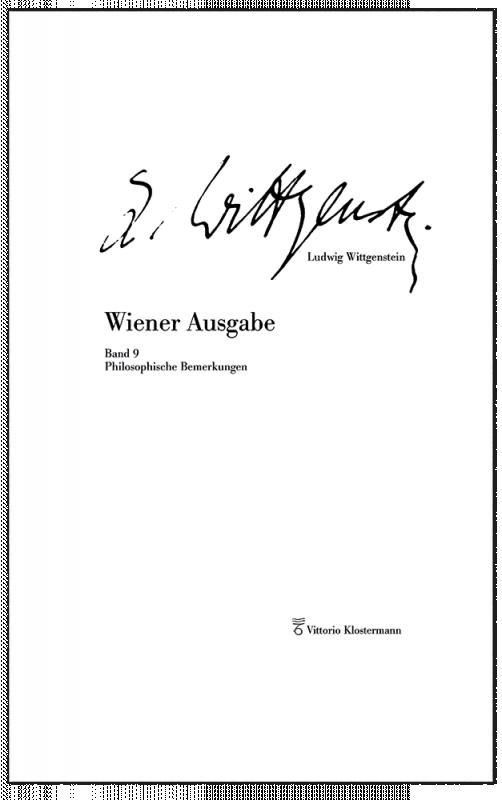
Band 9
der Reihe "Wittgenstein Wiener Ausgabe"
139,00
€
inkl. MwSt
- Verlag: Klostermann, Vittorio
- Themenbereich: Philosophie und Religion - Philosophie
- Genre: keine Angabe / keine Angabe
- Seitenzahl: 220
- Ersterscheinung: 02.2021
- ISBN: 9783465017967
Wiener Ausgabe
Band 9: Philosophische Bemerkungen
Michael Nedo (Herausgeber)
Mit Band WA9 der Wiener Ausgabe erscheinen Wittgensteins "Philosophische Bemerkungen" erstmals so, wie Wittgenstein sie in den Osterferien 1930 geschrieben bzw. aus der Synopse seiner ersten vier Manuskriptbände TS 208 (WA7) hergestellt hat. Damit liegt nun zum ersten Mal ein in sich abgeschlossenes Korpus aus Wittgensteins nachgelassenem Werk vollständig vor, das es möglich macht, Wittgensteins komplexe Gedankenbewegungen umfassend zu studieren: von den Übergängen aus den Manuskriptbänden I bis IV (WA1 und WA2) in die Synopse TS 208 (WA7) – die von Wittgenstein ausgewählten Bemerkungen zur Beurteilung seiner Arbeiten von 1929 bis 1930 – und von dort in die Neuordnung der Synopse in der Zettelsammlung TS 209, in die "Philosophischen Bemerkungen", dem Band 9 der Wiener Ausgabe.
Über die linken Randapparate der Bände der Wiener Ausgabe ist der Text mit dem jeweils vorausgehenden so verknüpft, dass Leser nachvollziehen können, wie die Bemerkungen in einem neuen Kontext ihre Bedeutung ändern. Das ist Wittgensteins Methode der Wiederholung, der „Übergang von der Frage nach der Wahrheit zur Frage nach dem Sinn“. Der in den Bänden der Wiener Ausgabe rückwärts gerichtete Apparat wird in der Zukunft durch einen elektronischen ergänzt und erweitert. In diesem Apparat können die vielfältigen Verknüpfungen von Wittgensteins Bemerkungen in allen Richtungen nachvollzogen werden. Mit dem Erscheinen weiterer Bände der Edition werden diese Verknüpfungen, das „Organische“ von Wittgensteins Denken und Schreiben, nach und nach offengelegt.
Volume WA9 of the Vienna edition is the first publication of Wittgenstein's "Philosophical Remarks" as Wittgenstein wrote them down during the Easter holidays of 1930 or, rather, as he produced them from the synopsis of his first four manuscript volumes TS 208 (WA7). This is the first time that a self-contained corpus of Wittgenstein's posthumous work is available in its entirety, making it possible to study Wittgenstein's complex movements of thought in detail: from the transitions from manuscript volumes I to IV (WA1 and WA2) to the synopsis TS 208 (WA7) - the remarks selected by Wittgenstein for the evaluation of his work from 1929/1930 - and from there via the rearrangement of the synopsis in the TS 209 note collection to the "Philosophical Remarks", volume 9 of the Vienna Edition.
Via the left margin apparatuses of the volumes of the Vienna Edition, the text is linked to the preceding one in such a way that readers can understand how the remarks change their meaning in a new context. This is Wittgenstein's method of repetition, the "transition from the question of truth to the question of meaning". The apparatus that goes backwards in the volumes of the Vienna edition will be supplemented and expanded in the future by an electronic one. In this apparatus, the manifold connections of Wittgenstein's comments can be traced in all directions. With the publication of further volumes of the edition, these links, the "organic" nature of Wittgenstein's thought and writing, will gradually be revealed.
Über die linken Randapparate der Bände der Wiener Ausgabe ist der Text mit dem jeweils vorausgehenden so verknüpft, dass Leser nachvollziehen können, wie die Bemerkungen in einem neuen Kontext ihre Bedeutung ändern. Das ist Wittgensteins Methode der Wiederholung, der „Übergang von der Frage nach der Wahrheit zur Frage nach dem Sinn“. Der in den Bänden der Wiener Ausgabe rückwärts gerichtete Apparat wird in der Zukunft durch einen elektronischen ergänzt und erweitert. In diesem Apparat können die vielfältigen Verknüpfungen von Wittgensteins Bemerkungen in allen Richtungen nachvollzogen werden. Mit dem Erscheinen weiterer Bände der Edition werden diese Verknüpfungen, das „Organische“ von Wittgensteins Denken und Schreiben, nach und nach offengelegt.
Volume WA9 of the Vienna edition is the first publication of Wittgenstein's "Philosophical Remarks" as Wittgenstein wrote them down during the Easter holidays of 1930 or, rather, as he produced them from the synopsis of his first four manuscript volumes TS 208 (WA7). This is the first time that a self-contained corpus of Wittgenstein's posthumous work is available in its entirety, making it possible to study Wittgenstein's complex movements of thought in detail: from the transitions from manuscript volumes I to IV (WA1 and WA2) to the synopsis TS 208 (WA7) - the remarks selected by Wittgenstein for the evaluation of his work from 1929/1930 - and from there via the rearrangement of the synopsis in the TS 209 note collection to the "Philosophical Remarks", volume 9 of the Vienna Edition.
Via the left margin apparatuses of the volumes of the Vienna Edition, the text is linked to the preceding one in such a way that readers can understand how the remarks change their meaning in a new context. This is Wittgenstein's method of repetition, the "transition from the question of truth to the question of meaning". The apparatus that goes backwards in the volumes of the Vienna edition will be supplemented and expanded in the future by an electronic one. In this apparatus, the manifold connections of Wittgenstein's comments can be traced in all directions. With the publication of further volumes of the edition, these links, the "organic" nature of Wittgenstein's thought and writing, will gradually be revealed.
Meinungen aus der Lesejury
Es sind noch keine Einträge vorhanden.

